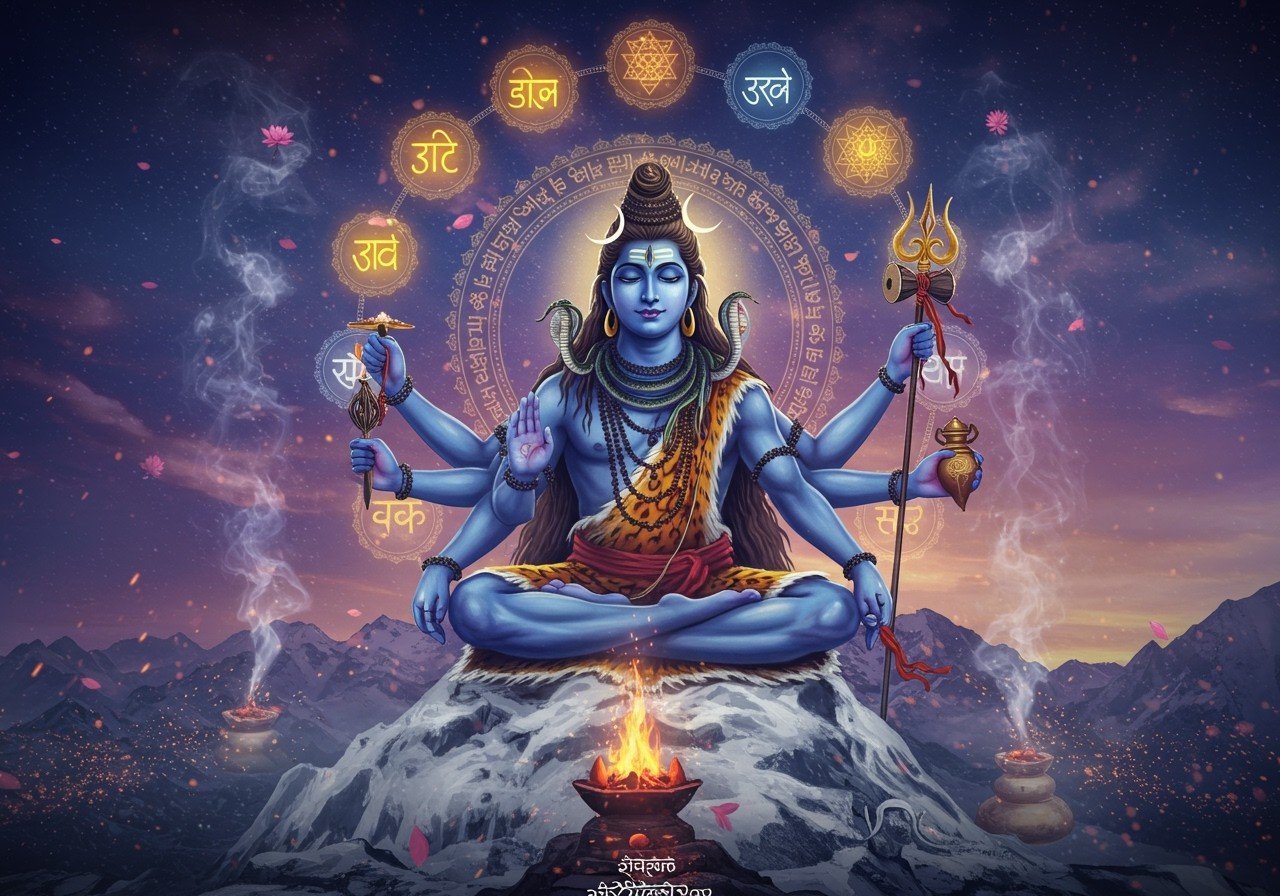
The Rudrashtakam, a powerful Sanskrit hymn, holds immense spiritual significance for devotees of Lord Shiva. Composed by the revered Goswami Tulsidas, this eight-verse hymn, originating from the Ramcharitmanas, beautifully encapsulates the poet’s deep adoration and spiritual yearning. For those seeking spiritual solace and a deeper connection with the divine, the Rudrashtakam stands as a beacon of timeless wisdom and profound philosophical insights.
Let’s explore the essence of each verse, delving into their deeper meanings and the blessings they bestow:
Verse 1: Invoking the Supreme – The Divine Essence of Shiva
The first verse sets the tone, invoking Lord Shiva’s transcendental nature. It describes him as the formless, omnipresent, the destroyer of ignorance – a divine essence beyond human comprehension, yet brimming with supreme power and boundless benevolence. Words like ‘Nirguna’ (without qualities) and ‘Nirvikalpa’ (without alternatives) emphasize Shiva’s divine essence, inviting us to contemplate the very nature of the divine. The imagery of Shiva as infinite light dispelling darkness resonates deeply, setting the stage for a spiritual journey.
Verse 2: The Auspicious Form of Shiva
Visualize the crescent moon adorning Shiva’s head, a symbol of tranquility and serenity. The sacred Ganga flows from his matted locks, representing purity and life-giving energy. This verse portrays Shiva’s benevolent form, highlighting his compassionate heart (‘Karuna’) and his role as the sustainer of cosmic order. It’s a comforting image for devotees, reassuring them of Shiva’s protective gaze and ever-present blessings.
Verse 3: The Embodiment of Detachment
Clad in animal hides and smeared with ashes, Shiva embodies detachment from worldly possessions. As ‘Digambara,’ clothed by the directions themselves, he transcends physical needs, symbolizing the ultimate ascetic. This image inspires us to reflect on our own attachments, encouraging a path towards inner peace and self-realization by letting go of material desires.
Verse 4: The Lord of Time
‘Mahakala,’ the great timekeeper, governs the cycles of creation and destruction, reminding us of life’s impermanence. His ‘Trinetra,’ the three eyes, perceive past, present, and future, embodying timeless wisdom. This verse invites us to accept life’s constant changes with grace, recognizing each moment as a part of the grand cosmic play. Delve deeper into the Ramcharitmanas, the source of the Rudrashtakam, to further understand these concepts.
Verse 5: The Protector and Destroyer
This verse reveals Shiva’s dual nature. As both protector and destroyer, wielding the ‘Pinaka’ bow and ‘Trishula’ trident, he maintains cosmic balance, upholding dharma and restoring order. This duality symbolizes the cyclical nature of existence—creation and destruction intertwined. It encourages us to embrace change as an opportunity for personal transformation, harnessing Shiva’s energy for inner growth.
Verse 6: The Divine Teacher
Shiva, the guru, imparts wisdom through ‘Jnana’ (knowledge) and ‘Vairagya’ (dispassion), guiding us toward enlightenment and liberation. His yogic traditions offer a roadmap for self-discovery. This verse inspires spiritual seekers to deepen their understanding and align with their true purpose, unlocking their transformative potential. You can explore more about spiritual practices on our blog post about the Hanuman Chalisa.
Verse 7: The Embodiment of Grace
With the ‘Abhaya Mudra,’ the gesture of fearlessness, Shiva reassures us of his protection. As an ocean of mercy, he fulfills the wishes of those who surrender to him. This verse encourages faith and devotion, reminding us to trust in divine grace to overcome obstacles and attain spiritual fulfillment.
Verse 8: The Ultimate Refuge
‘Moksha’ (liberation) and ‘Ananda’ (bliss) represent the spiritual goals attainable through devotion to Shiva. This inclusive verse emphasizes that divine love is universal, offering refuge and salvation to all, regardless of background. It’s a reminder of our interconnectedness and the potential for spiritual awakening within each of us.
Meaning and Significance of the Rudrashtakam
The Rudrashtakam is more than just a hymn; it’s a heartfelt expression of devotion and gratitude toward Lord Shiva. It beautifully encapsulates his diverse attributes, from the fierce destroyer of evil to the compassionate bestower of liberation. This spiritual masterpiece emphasizes complete surrender to Lord Shiva as the pathway to inner peace, happiness, and liberation from the cycle of birth and death.
- Praise of Lord Shiva: The Rudrashtakam embodies a profound love and reverence for Lord Shiva, expressing the devotee’s heartfelt gratitude.
- Divine Attributes: Each verse paints a vivid picture of Shiva’s various forms, both awe-inspiring and gentle, highlighting his formlessness, omnipresence, and his power to vanquish negativity while bestowing liberation.
- Spiritual Significance: The hymn’s core message lies in surrendering to Lord Shiva, finding inner peace and happiness, and ultimately breaking free from the cycle of reincarnation.
- Removes Worldly Ties: Reciting the Rudrashtakam is believed to help detach from materialistic pursuits, enabling a focus on spiritual growth.
- Cleanses the Soul: It acts as a purifier for the mind and soul, guiding individuals toward tranquility and inner peace.
Benefits of Chanting the Rudrashtakam
Chanting the Rudrashtakam is believed to bring numerous benefits, enriching one’s spiritual journey and promoting overall well-being.
- Spiritual Growth: Invoking Shiva’s blessings through this hymn is believed to accelerate spiritual development and provide divine guidance.
- Inner Peace and Calmness: Regular recitation calms the mind, reduces stress, and fosters a sense of tranquility.
- Purification of Negative Energies: It cleanses negative energies and dispels negative thoughts and emotions, creating a positive aura.
- Protection: Creates a spiritual shield against negative influences and attracts positive energies into your life.
- Focus and Piety: Daily chanting enhances focus, promotes piety, and encourages a life aligned with spiritual principles.
- Disease Relief: Traditional beliefs suggest it aids in alleviating ailments and promoting physical well-being.
- Improved Well-being: Harmonizes energy flow, promoting holistic health and vitality.
- Fulfilment: Worshiping Shiva through this hymn leads to a sense of peace, happiness, and ultimate liberation.
- Spiritual Virtues: Cultivates spiritual virtues and attracts Shiva’s benevolence.
Poojn.in: Your Companion on Your Spiritual Journey
At poojn.in, we understand the deep significance of connecting with the divine. As India’s leading cultural goods and services store, we offer a wide range of authentic puja items to support your spiritual practices. Whether you’re seeking a Rudraksha mala for your Rudrashtakam chanting, pure copper kalash for offerings, premium dhoop and agarbatti to create a sacred ambiance, or a complete Shiva puja set, we have everything you need. We also offer a variety of agarbatti fragrances, including Kacha Bella and Kasturi.
Visit our website or contact us via phone (03369029784) or WhatsApp (9476142738) for expert guidance and assistance with your puja needs.
Embrace the Power of Rudrashtakam
The Rudrashtakam is a journey of devotion, offering solace, guidance, and a deeper understanding of Lord Shiva’s divine essence. Let its wisdom illuminate your path, fostering inner peace and spiritual growth. Embrace its teachings, and may Lord Shiva’s blessings enrich your life.


